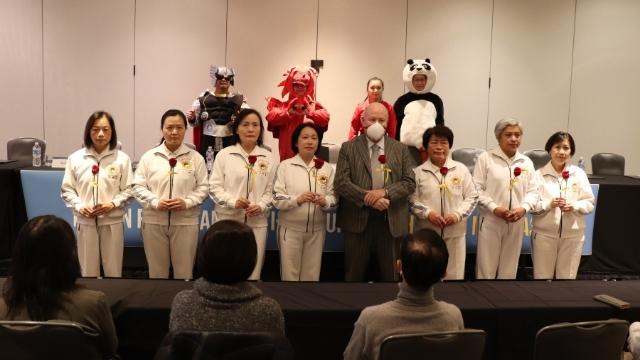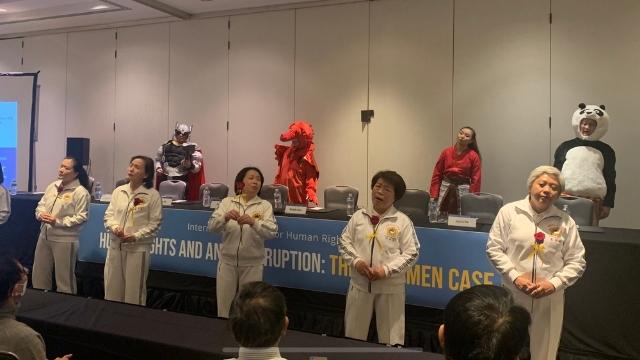12/14/2021 DANIELA BOVOLENTA A+ | A-
An international forum for human rights denounced corruption as a violation of human rights, as epitomized by what happened to Tai Ji Men in Taiwan.
by Daniela Bovolenta

On December 6, 2021, CESNUR and Human Rights Without Frontiers organized another one of their events on the Tai Ji Men case. This time, it was a hybrid “International Forum for Human Rights,” as some attended in person at the JW Marriott Hotel in Washington DC and some were connected via Zoom. The theme was “Human Rights and Anti-Corruption: The Tai Ji Men Case,” and the event was held in anticipation of the United Nations International Anti-Corruption Day of December 9 and Human Rights Day of December 10.
After a cultural presentation by American dizi, Jenny Hsiung introduced the event and the opening video, featuring Tai Ji Men’s trademark martial arts performances, inspiring as Hsiung said courage and conscience in everybody.
She then introduced the speakers from the academia and the human rights community. Massimo Introvigne, managing director of CESNUR and editor-in-chief of Bitter Winter, connected to the Tai Ji Men case the notion of “corruptio optimi pessima,” a Latin motto meaning that the corruption of the best things is the worst corruption of them all. He explained that this notion was at the center of the thought of influential Austrian philosopher Ivan Illich, whom Introvigne met personally. Illich connected corruption to the prevalence of large bureaucracies without conscience, which replaced individual face-to-face kindness and charity.
While Illich’s radical and utopian ideas are difficult to apply to modern states, where after all we need large institutions and bureaucrats, his thought may help understanding how, as evidenced by cases such as Tai Ji Men’s, corruption is not only about some individuals pocketing money but is also a spiritual evil, violating the deepest values of conscience and eating the soul of a nation. Normally, when not stopped on time, this corruption destroys nations, and this is the risk Taiwan runs now, Introvigne said, if it does not manage to acknowledge what corrupted bureaucrats did and to solve the Tai Ji Men case.https://www.youtube.com/embed/srCdG51XcS8?feature=oembedThe full video of the Forum.
PierLuigi Zoccatelli, professor of Sociology of religions at Pontifical Salesian University, discussed how the United Nations, following scholars, has acknowledged that corruption is a violation of human rights. This is very important for the Tai Ji Men case, Zoccatelli said. Corruption per se is a domestic matter states should solve by themselves. On the other hand, human rights are a different issue, and the United Nations, other international organizations, and countries such as the United States have acknowledged that when human rights are violated the international community and even individual countries have a right and a duty to intervene.
Zoccatelli noted that the United Nations acknowledged that article 2(1) of the International Covenant on Economic, Social and Cultural Rights (ICESCR) implicitly includes the notion that corruption is a violation of human rights. Since Taiwan in 2009 made ICESCR part of its domestic law, Zoccatelli concluded that it has a duty to rectify the gross corruption involved in the Tai Ji Men case.

Willy Fautré, co-founder and director of Human Rights Without Frontiers, continued the discussion on United Nations documents about corruption. While an internationally shared definition of corruption is still missing, Fautré noted, almost all countries in the world have signed and ratified the UN Convention against Corruption (UNCAC), and there is a progress towards an approach considering corruption not only a criminal problem but a human rights issue.
If Taiwan wants to conform to these international indications, Fautré said, it should reform its administrative justice system, seriously punish corrupted bureaucrats such as those responsible for the Tai Ji Men case, and eliminate the bonus system, which gives monetary awards to officers who collect tax bills, and systematically creates corruption.
Camelia Marin, deputy director of the NGO Soteria International, said that in our time the rule of law is challenged not only by abusive application of the laws but also by corruption. That creates administrative persecution based on corruption, of which the Tai Ji Men case is an example. When the Universal Declaration of Human Rights was promulgated in 1948, Marin said, references to corruption were not included. Yet, history has proven that corruption may frustrate the purposes of the Declaration and prevent the full enjoyment of human rights. A typical example of how corruption necessarily leads to violating human rights is the Tai Ji Men case, Marin concluded, expressing the opinion that the system of bonuses has a powerful corrupting effort in Taiwan and should be eliminated.
Alessandro Amicarelli, a London-based human rights lawyer and the president of the European Federation for Freedom of Belief (FOB), mentioned how according to certain international reports there have been improvements in the fight against corruption in Taiwan. This makes even more obscure why the Tai Ji Men case is not solved, where corruption was at work at three different levels: the Prosecutor’s office, the National Taxation Bureau, and the Administrative Enforcement Agency.
Amicarelli wondered whether it may exist in Taiwan a “domestic corruption chain” involving several offices and agencies. If such is the case, he argued, this chain should be identified and dismantled, Tai Ji Men indemnified for the material and moral damages they suffered, and their sacred land returned to them without delay. It is great time, Amicarelli said, to move from prosecuting the innocent to prosecute those who have been guilty of violating human rights.
After a video about the high praise Tai Ji Men has received from the highest authorities in Taiwan was presented, Hsiung introduced eight testimonies.
Chen Ying-Jing, an assistant professor at National Taiwan University, summarized the impressive efforts by Tai Ji Men and its leader, Dr. Hong Tao-Tze, to promote conscience, love, and peace internationally, which played a crucial role in the designation by the United Nations of April 5 as the International Day of Conscience. She also summarized the main events of the Tai Ji Men case, and insisted this is not a pure administrative case of tax law but a gross violation of FORB (freedom of religion or belief), which also has international implications.
Cici Han, an architect in training in California and a Tai Ji Men dizi (disciple), told how she started practicing qigong at age 13. Her first aim was improving her health, as she was suffering from severe allergy and dermatitis. Then, she realized that practicing qigong for physical health is just a first part, there is an even more important second part that deals with improving our state of mind. Han said that the most decisive lesson she learned in Tai Ji Men is to admit our mistakes rather than concealing them. She believes this simple principle is precisely the problem in the Tai Ji Men case. Once they made mistakes, lesser and higher Taiwanese bureaucrats refused to admit them, and made new mistakes in an attempt to conceal the old ones. This shows, Han said, that the Tai Ji Men case is a question of justice but at the same time is a question of conscience.
Coco Yeh, a Taiwanese American dizi, reported how her father, deeply marked by the trauma of World War II, managed to let go of his past after he met Tai Ji Men. Later, the family learned from Tai Ji Men how to overcome the grief of his death, applying Dr. Hong’s teaching that happiness is a choice rather than a result. As a Taiwanese American, Yeh has studied with interest the 2020 U.S. Department of State’s country report on Taiwan, which is part of its international report on human rights. The document states that “serious acts of corruption” are a “significant human rights issue” in Taiwan. What happened in the Tai Ji Men case, Yeh said, proves that this statement is totally correct, and that to become a solid democracy Taiwan needs to tackle the corruption problem. By returning to Tai Ji Men the property illegally seized, abolishing the immoral tax bonuses, and punishing the corrupt officers involved in the case, Yeh concluded, Taiwan may prove it is on the right path. Yen’s speech was followed by a short artistic performance on the Tai Ji Men case as a human rights issue.

Polly Han is a customs broker in California and a dizi. She reported how she should take daily decisions when advising importers how to classify the imported merchandise and pay their duty rates fairly and honestly. So, she said, she is surely not against paying taxes when really due, but the real question is conscience. Some believe an adult makes more than 35,000 decisions per day, and whether conscience is able to work as a compass or is broken is of the outmost importance, she observed. The problem with the rogue bureaucrats who persecuted Tai Ji Men, Han said, is not that they wanted taxes paid, is that they let corruption rather than conscience guide their decisions, resulting on illegal taxes being imposed for their personal gain.
Michelle Shen, a young 8th grader student in Los Angeles, reported she has participated in Tai Ji Men protests since she was first brought there by her parents since she was 2. Now, she is working with a friend on a documentary about the case for a school project. In 2021, she came to Washington DC to attend the International Religious Freedom Summit and met the Summit’s co-chairs Sam Brownback and Katrina Lantos Swett. The latter was surprised when Michelle, despite her young age, asked a question about how we can use conscience to navigate the world. Growing up, Michelle discovered how all Tai Ji Men dizi were deeply affected by the case, but also realized that ultimately the decisive question is whether government officers are ready to upheld truth and conscience or prefer to follow the path of corruption and greed.
Noemi M. Nakano, a dizi from Los Angeles, described her experience as a Mexican immigrant who came to the U.S. at age 5, and was later introduced to Tai Ji Men by an acupuncturist, Dr. Lee, who greatly helped her. She also reported that she went to Mexico in March 2020, right before the COVID-19 quarantine started, to help organizing there the celebration of the International Day of Conscience. Then, she found in qigong and self-cultivation the strength needed for taking care of her mother, a hospice care patient. It pains her heart to see how this international work of peace and love, helping so many, finds obstacles in the illegal activities and corruption of a few Taiwanese officials, she said. Nakano’s speech was followed by a video summarizing the human rights violations and illegal actions of some bureaucrats in the Tai Ji Men case.
Jeff Chen, a software engineer and a dizi, told the story of how his whole family found help in Tai Ji Men after his grandfather died in a car accident.
Originally a shy person, Chen’s character changed completely after he joined Tai Ji Men. He was selected repeatedly as class leader at his school, and participated in international cultural activities with Tai Ji Men. He expressed his interest for the campaign “Your NO counts,” launched by the United Nations to teach youth to say no to corruption, drugs, and crime. He believes that the “no” thousands of dizi and many international scholars and human rights experts are saying to the corruption prevailing in the Tai Ji Men case also counts, and hopefully may touch the mind and the hearth of authorities in Taiwan.
Jessica Kuo, a counselor supporting the mental health and wellness education of immigrants in Canada and a Tai Ji Men dizi, reported how she applied with great effectiveness the teachings of Dr. Hong in her work, and how thrilled she was to meet Dr. Hong when he came to Washington DC in 2001 to attend the inauguration of President Bush. She expressed her disappointment that letters she and other dizi in Canada sent to the three Taipei Economic and Cultural Offices in Ottawa, Toronto, and Vancouver about the Tai Ji Men case were ignored. Taiwan’s authorities, Kuo said, seem not to realize how deeply disturbed overseas Taiwanese are by the non-democratic and anti-human-rights behavior of those handling the Tai Ji Men case.
Massimo Introvigne, before introducing a final musical video, concluded the webinar by stating that the various speeches demonstrated that corruption is indeed a human rights problem. Whether it is or it isn’t, is not a purely academic question. As a human rights question, corruption in the Tai Ji Men case should be dealt with as part of Taiwan’s commitment to make the ICESCR part of its domestic law, Introvigne said. And because it is a human rights question, the behavior of corrupted bureaucrats in the Tai Ji Men case is something that should be dealt with not only locally but internationally.
Source: Bitter Winter
